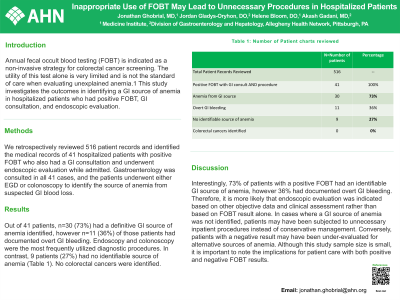Sunday Poster Session
Category: GI Bleeding
P0750 - Inappropriate Use of FOBT May Lead to Unnecessary Procedures in Hospitalized Patients
Sunday, October 27, 2024
3:30 PM - 7:00 PM ET
Location: Exhibit Hall E

Has Audio

Jonathan Ghobrial, MD
Allegheny Health Network Medicine Institute
Pittsburgh, PA
Presenting Author(s)
Jonathan Ghobrial, MD1, Jordan Gladys-Oryhon, DO2, Helene Bloom, DO2, Akash Gadani, MD3
1Allegheny Health Network Medicine Institute, Pittsburgh, PA; 2Allegheny Health Network, Pittsburgh, PA; 3Allegheny General Hospital, Pittsburgh, PA
Introduction: Annual fecal occult blood testing (FOBT) is indicated as a non-invasive strategy for colorectal cancer screening. The utility of this test alone is very limited and is not the standard of care when evaluating unexplained anemia.1 This study investigates the outcomes in identifying a GI source of anemia in hospitalized patients who had positive FOBT, GI consultation, and endoscopic evaluation.
Methods: We retrospectively reviewed 516 patient records and identified the medical records of 41 hospitalized patients with positive FOBT who also had a GI consultation and underwent endoscopic evaluation while admitted. Gastroenterology was consulted in all 41 cases, and the patients underwent either EGD or colonoscopy to identify the source of anemia from suspected GI blood loss.
Results: Out of 41 patients, n=30 (73%) had a definitive GI source of anemia identified, however n=11 (36%) of those patients had documented overt GI bleeding. Endoscopy and colonoscopy were the most frequently utilized diagnostic procedures. In contrast, 9 patients (27%) had no identifiable source of anemia. No colorectal cancers were identified.
Discussion: Interestingly, 73% of patients with a positive FOBT had an identifiable GI source of anemia, however 36% had documented overt GI bleeding. Therefore, it is more likely that endoscopic evaluation was indicated based on other objective data and clinical assessment rather than based on FOBT result alone.2 In cases where a GI source of anemia was not identified, patients may have been subjected to unnecessary inpatient procedures instead of conservative management. Conversely, patients with a negative result may have been under-evaluated for alternative sources of anemia.3 Although this study sample size is small, it is important to note the implications for patient care with both positive and negative FOBT results.
Disclosures:
Jonathan Ghobrial, MD1, Jordan Gladys-Oryhon, DO2, Helene Bloom, DO2, Akash Gadani, MD3. P0750 - Inappropriate Use of FOBT May Lead to Unnecessary Procedures in Hospitalized Patients, ACG 2024 Annual Scientific Meeting Abstracts. Philadelphia, PA: American College of Gastroenterology.
1Allegheny Health Network Medicine Institute, Pittsburgh, PA; 2Allegheny Health Network, Pittsburgh, PA; 3Allegheny General Hospital, Pittsburgh, PA
Introduction: Annual fecal occult blood testing (FOBT) is indicated as a non-invasive strategy for colorectal cancer screening. The utility of this test alone is very limited and is not the standard of care when evaluating unexplained anemia.1 This study investigates the outcomes in identifying a GI source of anemia in hospitalized patients who had positive FOBT, GI consultation, and endoscopic evaluation.
Methods: We retrospectively reviewed 516 patient records and identified the medical records of 41 hospitalized patients with positive FOBT who also had a GI consultation and underwent endoscopic evaluation while admitted. Gastroenterology was consulted in all 41 cases, and the patients underwent either EGD or colonoscopy to identify the source of anemia from suspected GI blood loss.
Results: Out of 41 patients, n=30 (73%) had a definitive GI source of anemia identified, however n=11 (36%) of those patients had documented overt GI bleeding. Endoscopy and colonoscopy were the most frequently utilized diagnostic procedures. In contrast, 9 patients (27%) had no identifiable source of anemia. No colorectal cancers were identified.
Discussion: Interestingly, 73% of patients with a positive FOBT had an identifiable GI source of anemia, however 36% had documented overt GI bleeding. Therefore, it is more likely that endoscopic evaluation was indicated based on other objective data and clinical assessment rather than based on FOBT result alone.2 In cases where a GI source of anemia was not identified, patients may have been subjected to unnecessary inpatient procedures instead of conservative management. Conversely, patients with a negative result may have been under-evaluated for alternative sources of anemia.3 Although this study sample size is small, it is important to note the implications for patient care with both positive and negative FOBT results.
Disclosures:
Jonathan Ghobrial indicated no relevant financial relationships.
Jordan Gladys-Oryhon indicated no relevant financial relationships.
Helene Bloom indicated no relevant financial relationships.
Akash Gadani: Phathom Pharmaceuticals – Speakers Bureau.
Jonathan Ghobrial, MD1, Jordan Gladys-Oryhon, DO2, Helene Bloom, DO2, Akash Gadani, MD3. P0750 - Inappropriate Use of FOBT May Lead to Unnecessary Procedures in Hospitalized Patients, ACG 2024 Annual Scientific Meeting Abstracts. Philadelphia, PA: American College of Gastroenterology.
